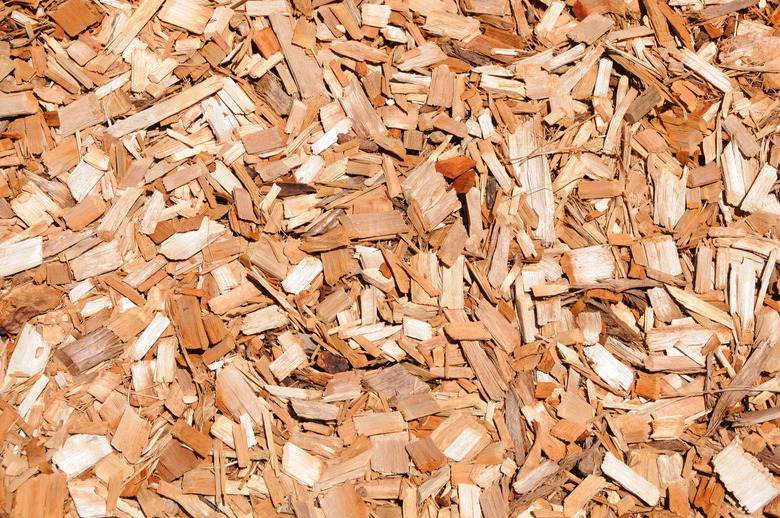Cypress Mulch And Insects
Most homeowners are aware of the many benefits of mulch. Mulch provides an incredibly protective layer above soil that helps regulate soil temperature and moisture level; it also helps prevent weeds from popping up in landscaping beds and gardens. Mulch doesn't come without downsides, however; one of the biggest concerns about mulch is that it can provide an ideal habitat for many nuisance pests, including destructive insect species. Many myths have surfaced regarding cypress mulch's ability to deter pests; most are false.
Step 1
One of the major selling points for cypress mulch used to be that it supposedly deterred termites and other structure-invading pests. Unfortunately, however, that myth has been disproved through scientific studies. A University of Florida Extension study showed that termites still ate and attacked today's cypress mulch, which is a completely different kind of mulch from yesteryear's cypress mulch. Tidewater red cypress mulch, made from mature tidewater red cypress trees' heartwood, was much more resistant to termites. Tidewater red cypress (Taxodium distichum) is also known as bald cypress, swamp cypress and gulf cypress, among other common names; it is hardy in U.S. Department of Agriculture plant hardiness zones 4 through 10. Unfortunately, today's cypress mulch comes from very young trees with little or no heartwood; the termites consumed as much cypress mulch as other kinds of mulch in the study.
Step 2
Cypress Mulch vs. Other Insects
Step 1
One of the greatest issues with organic mulches is that homeowners tend to place them too close to the foundations of their homes. Organic mulches often provide ideal habitats for many insects, including destructive termite and ant species. Nuisance ants may nest in several kinds of organic mulches, including cypress bark. When such a mulch is too close to a home, ants can find direct access to the home's interior more easily than they would otherwise. On the other hand, the mulch's moist environment also attracts predatory arthropods such as centipedes, predatory ants and spiders, which feed on many nuisance species and other species that favor the mulch as habitat.
Step 2
- One of the major selling points for cypress mulch used to be that it supposedly deterred termites and other structure-invading pests.
- A University of Florida Extension study showed that termites still ate and attacked today's cypress mulch, which is a completely different kind of mulch from yesteryear's cypress mulch.
Other Mulches vs. Insects
Step 1
Mulches are either organic or inorganic. Organic mulches include those that come from trees, grass clippings, pine needles, recycled newspaper, leaves and manure. Inorganic mulches include various kinds of stone, recycled tires and plastic. According to a Kansas State University publication, pea gravel mulch has fewer invertebrates, such as insects, than other common kinds of mulch. The highest amount of invertebrate inhabitants is in organic mulches made of either hardwood or recycled wood. Although the cypress mulch of today isn't insect-resistant, Argentine ants and odorous house ants usually stay clear of fragrant cedar mulches. Cedar mulches typically are made from western redcedar (Thuja plicata), which is hardy in USDA zones 3b through 9; however, wood of other species often is in cedar mulches.
Step 2
Step 3
- Mulches are either organic or inorganic.
- Inorganic mulches include various kinds of stone, recycled tires and plastic.
Other Considerations
Step 1
Not only has cypress been disproved as an insect-resistant mulch, its manufacturing process is detrimental to the environment. Cypress forests provide many benefits to the ecosystem, including filtering pollutants and providing irreplaceable habitat for many native bird and other animal species. According to Suncoast Native Plant Society Inc., mulch production accounts for the destruction of thousands of acres of cypress forests each year. In addition, certain myths about cypress mulch, including that it's more aromatic and float-resistant than other mulches, are untrue.
Minimizing Insect Activity
Step 1
By following some basic application tips, home owners can cut down on the problems associated with insects infesting cypress mulch and other organic mulches. Keep cypress mulch at least 6 inches away from home foundations. If mulch is desired close to the home's foundation, use an inorganic type other than gravel, according to Kansas State University. Apply the cypress mulch at depths no deeper than 2 to 3 inches. To minimize the abundance of insects invading the mulch, disturb it on a regular basis through raking.
Step 2
- Not only has cypress been disproved as an insect-resistant mulch, its manufacturing process is detrimental to the environment.
- By following some basic application tips, home owners can cut down on the problems associated with insects infesting cypress mulch and other organic mulches.
References
- Kansas State University: Mulches and Living Organisms
- Suncoast Native Plant Society Inc: Cypress Mulch — Why Kill a Tree to Grow a Flower?
- University of Florida IFAS Extension, Polk County Master Gardeners: Here's the Skinny on Mulch
- Sierra Club: Don't Let Our Cypress Trees Become Another Louisiana Ghost Legend
- The Morton Arboretum: Bald-Cypress
- Hansen's Northwest Native Plant Database: Thuja Plicata (Western Redcedar, Giant Arborvitae)
